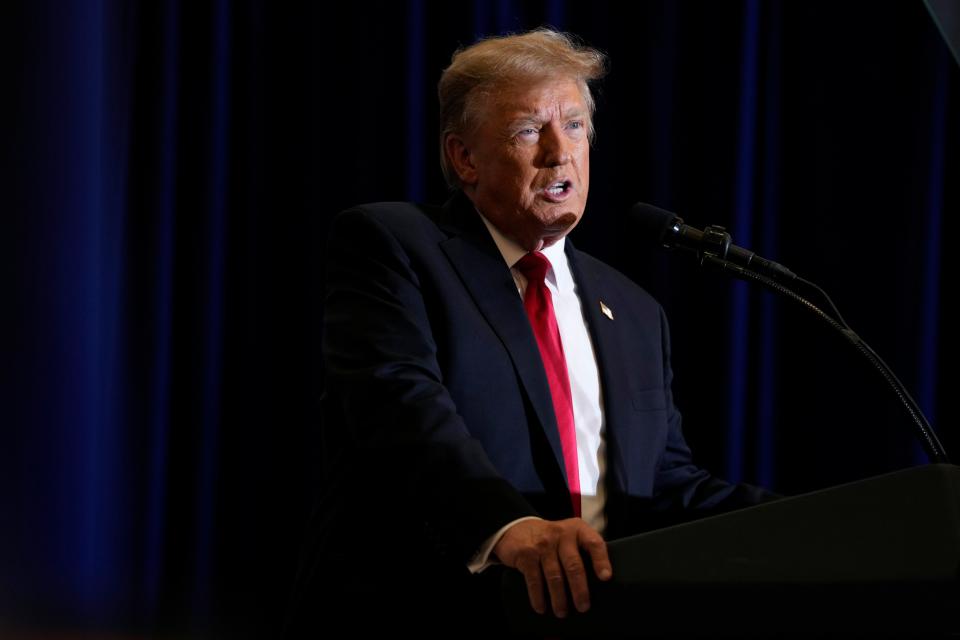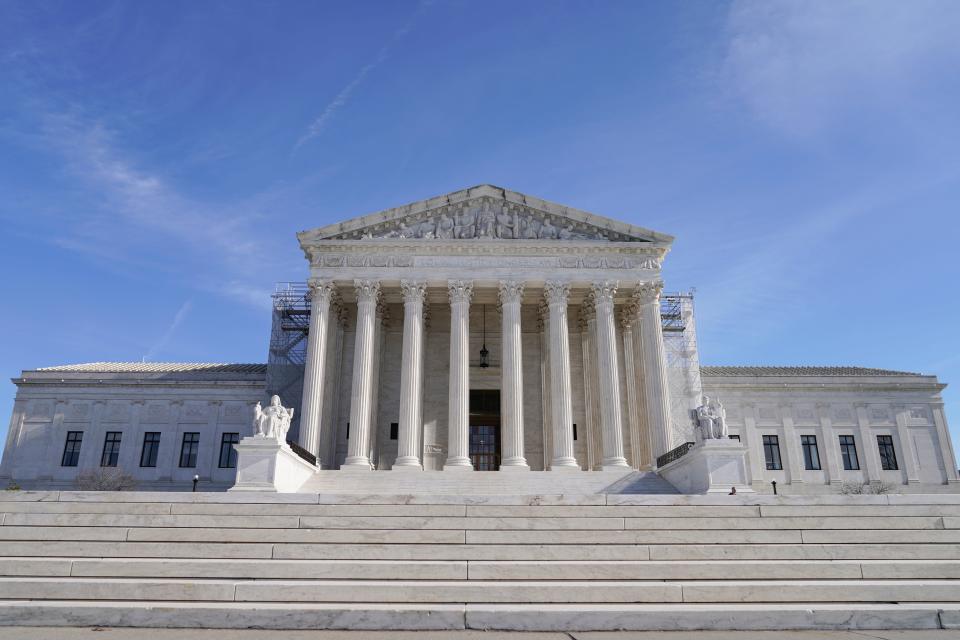In the Supreme Court's hands: How will the justices rule on Trump's ballot appeal?
- Oops!Something went wrong.Please try again later.
- Oops!Something went wrong.Please try again later.
In a nation where everyone takes a side on former President Donald Trump, there are nine people sitting in Washington who may be among the least eager to share their opinion: the justices of the Supreme Court.
And yet it is the Supreme Court that must now inevitably decide whether Trump, the frontrunner for the Republican nomination, will appear on the ballot in Colorado or whether a state court there was correct to rule that he disqualified himself by ginning up the mob that rioted at the U.S. Capitol on Jan. 6, 2021.
The stakes for this year's election are enormous: Not since an almost entirely different Supreme Court decided Bush v. Gore in 2000, effectively handing the presidency to George W. Bush, has the court wielded such potential power over presidential politics.
Because of that, the path ahead is also fraught for the Supreme Court, which remains a divisive institution after a series of ethics scandals and its 2022 decision to overturn Roe v. Wade.
Explainer: Supreme Court may want to avoid Trump. Colorado's ballot ruling won't let them
Most experts predict the court will proceed cautiously − and rule narrowly − to avoid the appearance of politics. In what could become a defining test of his tenure, Chief Justice John Roberts will likely seek to avoid a decision that pits the court's six conservatives against the three justices named by Democratic presidents. And the court will likely have to walk the high wire at a faster clip than it prefers to in order to head off other challenges.
"The court will feel pressed to move quickly as voters soon begin casting their votes around the country," said Notre Dame Law School Professor Derek Muller, who has been closely following the ballot issue for months.

How did Trump wind up at the Supreme Court?
The idea that Trump disqualified himself from a second term gained traction over the summer with a law review article by two conservative legal scholars − including one who clerked for Roberts. The theory is grounded in a Reconstruction-era provision of the 14th Amendment that bars people from serving as president if they took an oath as "an officer of the United States" and then "engaged in insurrection or rebellion."
Dozens of lawsuits cropped up relying on the theory to challenge Trump's eligibility for another term. Some state courts and officials looked at the idea and passed, including California, Minnesota and Michigan. But Colorado's Supreme Court and the secretary of state in Maine concluded Trump's actions barred him from their ballots.
"We do not reach these conclusions lightly," the Colorado court wrote in a 4-3 decision. "We are mindful of the magnitude and weight of the questions now before us. We are likewise mindful of our solemn duty to apply the law, without fear or favor, and without being swayed by public reaction to the decisions that the law mandates we reach."

Will the Supreme Court take Trump's appeal?
One reason most experts believe the court will take the case is that inaction will inevitably lead to more challenges in other states. Trump has already sued over the decision in Maine and, by his count, there are some 60 similar lawsuits and administrative appeals pending across the country.
The issue, in other words, isn't going away.
Inaction would have seismic implications in those other states, and it would almost certainly draw recriminations and distrust from Trump supporters. The court is unlikely to take that route without at least offering an explanation.
Finally, if the Supreme Court is going to have to decide the insurrection question eventually, both sides seem to agree it'd better to do it now rather than wait until Americans start voting. Maine and Colorado hold their primary elections on Super Tuesday, which falls on March 5 this year.

How will the court rule in the Trump case?
Predicting how the Supreme Court will decide − especially without hearing from the justices at an oral argument − is usually a bad idea. But in this case, given the political sensitivities involved, many experts speculate a majority of justices are likely looking for an "off ramp," a way to decide the case on narrow grounds.
And those scenarios all appear to benefit Trump.
The court might rule, for instance, that lower courts and election officials can't invoke the 14th Amendment's insurrection clause without some enabling law approved by Congress. After all, given that Trump has not been convicted of a crime, who decides whether he took part in an insurrection − and what process do they use?
Another potential off ramp: a ruling that the insurrection provision doesn't apply to former presidents. The Constitution refers to "officers" of the United States. It's not entirely clear what that means.
Trump raised both of those arguments in his appeal Wednesday.
"Trump's brief to the Supreme Court asks it to consider a variety of issues," Muller said. "Some of these do not require the court to delve into the events of January 6, 2021, or into Trump's state of mind when he was speaking to the crowd ahead of the riot. All Trump needs to do is win on one issue to get back on the ballot."

How quickly will the Supreme Court decide?
As the Supreme Court decides whether to take the case it must also decide how quickly to move. Normally, a major appeal arriving at the Supreme Court in January would not be argued until the fall.
But in a separate appeal filed by Colorado Republicans last month, both party officials and the voters who oppose Trump asked for expedited review. The GOP asked for a decision by early March. Noting early voting in Colorado and earlier state primaries, the voters asked for a schedule that would allow a decision by mid-February.
Both Colorado's high court and the Maine secretary of state held the impact of their decision until the courts resolve the issue. But the justices will almost certainly be mindful of the impact on voters being uncertain about Trump's viability if the legal questions around his candidacy are still unanswered as ballots are being filled out.
The questions raised by the case, Trump's lawyers wrote, "urgently require this court's prompt resolution."
This article originally appeared on USA TODAY: A reluctant Supreme Court now must decide if voters can pick Trump

